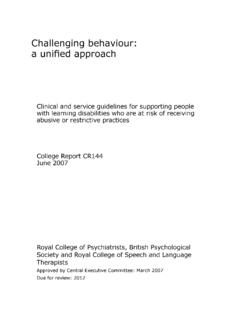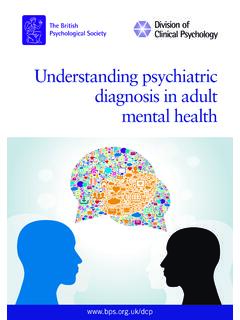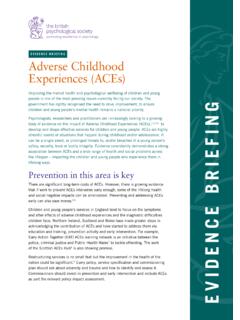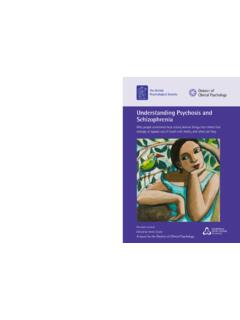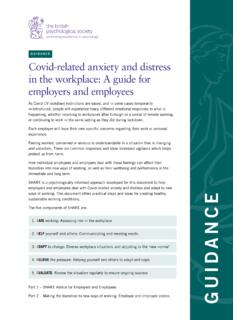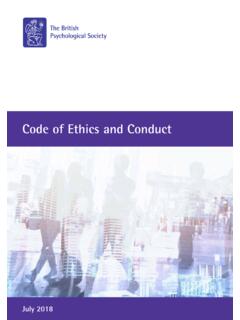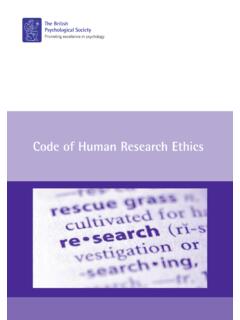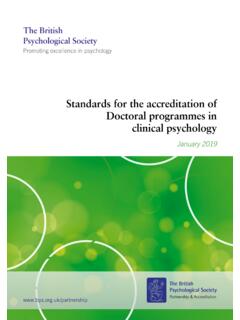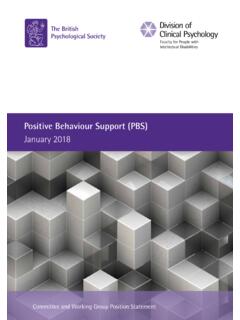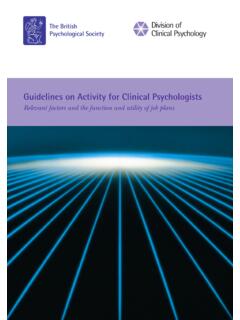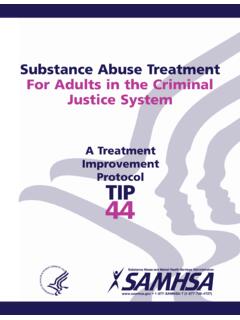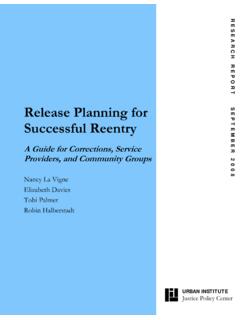Transcription of QUALIFICATION FORENSIC
1 FORENSICQUALIFICATION in FORENSIC PSYCHOLOGY(Stage 2)HANDBOOK for CANDIDATES (July 2021) USIf you have any questions about the QUALIFICATION in FORENSIC Psychology (Stage 2), please feel free to contact the Professional Development Delivery : Tel: +44 (0)116 252 9505 Our address is: Professional Development Delivery Team The British Psychological Society St Andrews House 48 Princess Road East Leicester LE1 7DR If you have problems reading this document because of a visual impairment and would like it in a different format, please contact us with your specific : +44 (0)116 252 9523; e: all other enquires please contact the Society on: t: +44 (0)116 254 9568; e: 2021 The British Psychological Society All rights reserved. No part of this publication may be reproduced or transmitted in any form or by any means, electronic or mechanical, including photocopy, recording or any information storage retrieval system, without permission in writing from the for Candidates (July 2021)3 FORENSIC PSYCHOLOGYCONTENTS1.
2 WELCOME Introduction Eligibility for registration Scope of FORENSIC psychology Training as an independent candidate Aims of the QFP (Stage 2) Structure and level of FORENSIC psychology training 72. ABOUT US FORENSIC Psychology Qualifications Board Professional Development & Assessment Department Assessor Team 93. ENROLMENT Eligibility to enrol Engaging a Co-ordinating Supervisor Planning your training Time requirements of supervised practice Length of enrolment Undertaking some of your training outside of the UK How to apply to enrol Monitoring progress Fees and payment options Interruptions from the QUALIFICATION Withdrawal from the QUALIFICATION 244. PROGRAMME OF TRAINING AND SUPERVISION Contact with your Co-Ordinating Supervisor Additional Supervisors Changing your Supervisor Quarterly supervision plans Updating your plan of training Practice Diary Competency Logbook Ethics and professional conduct Consent Support for Candidates Support for Supervisors 32 QUALIFICATION in FORENSIC Psychology (Stage 2) 4 FORENSIC PSYCHOLOGY5.
3 ASSESSMENT Deadline for submission Extensions to submission deadlines How to submit Exemplar reports Supporting evidence Submitting work for assessment Viva assessment Outcome of assessment Appeals and complaints 42 APPENDIX 1: CORE ROLES AND COMPETENCIES DEFINED 43 Core Role 1: Conducting psychological applications and interventions 43 Core Role 2: Research 47 Core Role 3: Communicating psychological knowledge and advice to other professionals 49 Core Role 4: Training other professionals in psychological skills and knowledge 54 APPENDIX 2: ILLUSTRATION OF POSSIBLE COMBINATIONS OF EXPERIENCES 57 Handbook for Candidates (July 2021)5 FORENSIC PSYCHOLOGY1. INTRODUCTIONThe British Psychological Society ( the Society ) is the learned and professional body, incorporated by Royal Charter, for psychologists in the United Kingdom. The Society has a total membership and subscribership of approximately 63,000, and is a registered charity.
4 Under its Royal Charter, the key objective of the Society is to promote the advancement and diffusion of the knowledge of psychology pure and applied, and especially to promote the efficiency and usefulness of members by setting up a high standard of professional education and knowledge .The Society s QUALIFICATION in FORENSIC Psychology (QFP) (Stage 2) is a route to eligibility for Chartered membership of the Society and Full membership of the Division of FORENSIC Psychology (DFP). We very much hope that you will find your time on the QUALIFICATION fulfilling and Candidate Handbook will provide you with full details about the competencies which you will be expected to develop and the methods by which you will be assessed. It also includes information about the key people you will have contact with during your enrolment. The handbook is designed to supplement the Regulations for the Society s Postgraduate Qualifications which you should read carefully and adhere to at all ELIGIBILITY FOR REGISTRATIONP ractitioner psychologists are regulated by the Health and Care Professions Council (HCPC) and the titles: practitioner psychologist and FORENSIC psychologist are protected by law.
5 This means that in order to use one of these titles in the UK you need to be appropriately registered in the UK. The QFP (Stage 2) is a HCPC approved QUALIFICATION , which means that upon successful completion of the QUALIFICATION you will be eligible to apply for registration with the HCPC. SCOPE OF FORENSIC PSYCHOLOGYG aining Chartered membership (CPsychol) and full membership of the Division of FORENSIC Psychology (DFP) reflects the highest standard of psychological knowledge and expertise which demonstrates a commitment to professional development and high ethical standards of practice, teaching and psychologists work empirically and theoretically, they adopt a scientist-practitioner perspective and have contributed to the development of research and assessment tools, their implementation, and best practice guidance in legal contexts, including civil and criminal, at home and internationally.
6 This combination of empirical base, theoretical understanding, and use of reputable guidelines ensures they deliver research, interventions and other FORENSIC services of the highest standard. In conjunction with being equipped to teach or supervise peers, FORENSIC psychologists aim to create and sustain inclusivity and diversity across the domains in which they work. As with all other professional psychologists, their work is subject to ethical, cultural and reflective practice in collaborative supervision with other psychologists, to achieve service user engagement and goals with particular populations and across diverse settings in dealing with particular in FORENSIC Psychology (Stage 2) 6 FORENSIC PSYCHOLOGYT raining in FORENSIC psychology is typically conducted in two stages to achieve the standards for CPsychol and Full membership of the DFP: Stage 1 and Stage 2. The first stage involves completion of a Society-accredited Master s degree in FORENSIC psychology.
7 For the second stage, trainees can follow the BPS independent practice route , leading to the QUALIFICATION in FORENSIC Psychology (Stage 2). This route requires supervised practice of core FORENSIC psychology competencies illustrated by a portfolio developed across four core areas. The portfolio of evidence demonstrates the acquisition of skills in relevant working contexts and with appropriate supervision. These are formally assessed through examination of the submitted training programme provides supervision in a range of skills and competencies that is applicable across a wide range of FORENSIC settings. Core competencies include assessment and interventions, applied FORENSIC research, development and implementation of policy, training other professionals, and generic professional psychology skills. In addition to these core competencies, FORENSIC psychologists in training may acquire a range of other skills such as managing and bringing about change in thinking patterns during behavioural change interventions.
8 Skills acquired during training are theoretically based and highly transferable across a range of contexts. The same behavioural change principles, for example, are applicable in settings as wide ranging as reducing the risk to the public of offending to enhancing investigation processes and working with individuals and groups to the benefit of self, wider communities and psychologists are trained to a doctoral level in a range of applications. They can work across a range of settings and with a range of problems. Settings can vary from large-scale prison programmes, secure mental health services to individual or small group consultations. FORENSIC psychologists work with a range of people, including those who have chronic difficulties, those at risk of offending as a consequence of their behaviour, family members, victims, and the public affected by crime, and so on. Interventions may be as varied as conducting group therapy programmes, supporting community care interventions, assessment of risk to inform treatment needs and plans, helping people manage substance misuse through self-change or assisting witnesses in court processes or investigations.
9 FORENSIC psychologists therefore may work directly with individuals or groups, support other FORENSIC professionals, or in other FORENSIC areas such as the courts, security, police and/or other law enforcement agencies or investigators. In addition to intervention skills, FORENSIC psychologists have high level research and consultancy skills that enable them to develop appropriate and targeted research studies. These can range in scope from the analysis of outcomes of a service provision to large scale publishable research. FORENSIC psychologists have made a significant contribution to international research focusing on a range of issues relevant to psychological applications linked to the criminal justice system using evidence-based practice to guide their approaches as reflective TRAINING AS AN INDEPENDENT CANDIDATEThe QUALIFICATION in FORENSIC Psychology (QFP) (Stage 2) provides a route where you can acquire the competencies necessary to become a safe, effective, ethical and autonomous practitioner in FORENSIC psychology, and is designed so that you can take responsibility for your own learning and training.
10 You will undertake the QUALIFICATION with the support of the BPS Programme Team and your Co-ordinating for Candidates (July 2021)7 FORENSIC PSYCHOLOGYThe team are committed to ensuring that the QFP (Stage 2) allows you the flexibility to develop the competencies (Core Roles) in your workplace setting(s) and submit work for assessment at a pace that fits in with your access to opportunities and other 1 must be awarded before you can commence training towards the QFP (Stage 2). AIMS OF THE QFP (STAGE 2)Upon successful completion of the QFP (Stage 2) you will: be an effective, ethical and reflective practitioner, who will engage in learning and development as commensurate for independent applied psychology practitioners; be competent across the four core roles of FORENSIC psychology; understand, develop and apply models of psychological inquiry for the creation of new knowledge which is appropriate to the multidimensional nature of relationships between people; and be eligible to register with the STRUCTURE AND LEVEL OF FORENSIC PSYCHOLOGY TRAININGThe QFP (Stage 2) is a professional body award, designed around work-based learning, which determines whether or not the required competencies have been demonstrated.
